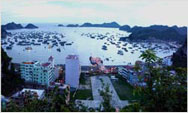You are here » Home » Telling Our Story
Success Story
Access to safe drinking water allows for better hygiene habits
Bringing Safe Water, Promoting Hygiene

| |
Photo: Anonymous
|
|
At a community meeting northeast of Baghdad, displaced families learned about hygiene practices that will benefit themselves and the entire community.
Most of the women did not know how to sew, even though many actually owned a sewing machine. After three weeks, they had learned to sew, make handicrafts, and provide first-aid in emergencies.
|
For many displaced Iraqis in the Diyala and Sulaymaniyah provinces northeast of Baghdad, access to safe drinking water used to be limited. Unable to return home, they had to make do with the resources available in temporary settlements. Lack of access to safe water caused both health and hygiene problems. Contaminated water causes sickness and disease that spread quickly in densely populated areas like the settlements. Also, without access to safe drinking water, it is difficult to maintain good hygiene.
Today, those conditions are changing, as USAID and its partners help provide fresh water to displaced families and educate them about good hygiene. Now that water is available to many displaced families, they are staying healthy and are able to perform basic hygiene routines. USAID offered hygiene education in 40 settlements in the two provinces. USAID supported training sessions for community members, teachers, water station caretakers, and religious leaders that aim to promote hygiene practices and prevent disease and water contamination.
At the end of training, participants returned to their settlements with important hygiene tips and advice. They worked with hygiene specialists to design appropriate programs and facilitated similar hygiene education sessions in their home communities.
By supporting community education efforts on water management, disease, personal hygiene, water contamination, and simple water treatment practices, USAID and its partners are improving the quality of life for displaced families in Iraq.
Print-friendly version of this page (440kb - PDF)
Click here for high-res photo
Back to Top ^ | 

